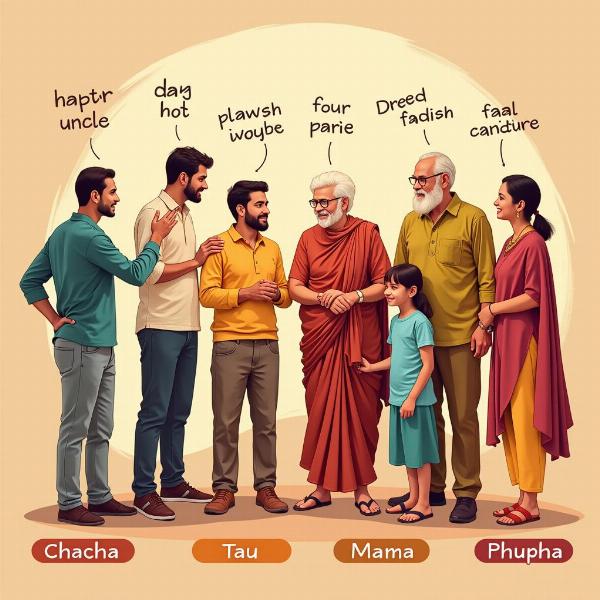Understanding kinship terms can be tricky, especially when navigating the nuances of different cultures. If you’re curious about how to address elders respectfully in Hindi, this article explores the various ways to say “uncle” and “aunty” in Hindi, delving into the cultural context and providing practical examples. This guide covers the “uncle aunty meaning in hindi” and addresses common questions.
Different Ways to Say Uncle in Hindi
Hindi, like many Indian languages, differentiates between paternal and maternal uncles. This distinction reflects the importance of family relationships and the specific roles these relatives play. Let’s examine the most common terms:
- Chacha (चाचा): This is the term for a younger brother of one’s father. It’s a term of endearment and respect.
- Tau (ताऊ): This term refers to the elder brother of one’s father. It carries a sense of seniority and respect.
- Mama (मामा): This word is used for the mother’s brother. The maternal uncle holds a special place in Indian culture, often considered a fun-loving and indulgent figure.
- Phupha (फूफा): This refers to the husband of one’s father’s sister (bua).
These terms are not simply labels; they reflect the unique bond within the extended family. Understanding their usage is crucial for navigating social situations and showing respect to elders.
 Hindi Uncle Terms
Hindi Uncle Terms
Different Ways to Say Aunty in Hindi
Similar to uncles, there are various terms for aunts in Hindi, reflecting the different relationships on both the paternal and maternal sides:
- Chachi (चाची): This is used for the wife of one’s father’s younger brother (chacha).
- Tai (ताई): This refers to the wife of one’s father’s elder brother (tau).
- Mami (मामी): This is the term for the wife of one’s mother’s brother (mama).
- Bua (बुआ): This term refers to one’s father’s sister.
Using the correct term not only shows respect but also helps clarify relationships within the complex web of the extended family.
Cultural Significance of Uncle and Aunty in Hindi
In Indian culture, family plays a central role, and extended family members are deeply integrated into daily life. Addressing uncles and aunts with the appropriate term is a sign of respect and strengthens family bonds. These relationships often extend beyond mere formality, with uncles and aunts acting as mentors, confidants, and sources of support.
Using Uncle and Aunty as General Terms of Address
While the specific terms mentioned above are ideal for addressing relatives, “uncle” and “aunty” are also used as general terms of respect for older individuals, even if they are not related. This is a common practice in India and shows politeness and deference to elders.
How do you say uncle and aunty in Hindi formally?
For a more formal address, you can use the terms “Sriman (श्रीमान)” for uncle and “Srimati (श्रीमती)” for aunty. These terms are generally used with their names.
What is the meaning of “Aunty Ki Hindi Meaning”?
This phrase is a bit redundant as it essentially translates to “Aunty’s Hindi Meaning.” It likely stems from someone trying to find the Hindi word for “aunty.” The correct way to phrase the question would be “What is the Hindi word for aunty?”
Conclusion: Navigating Kinship Terms in Hindi
Understanding the nuances of “uncle aunty meaning in hindi” provides a valuable glimpse into the richness of Indian culture and its emphasis on family relationships. Using the appropriate term demonstrates respect and strengthens bonds within the extended family. Whether you are addressing a relative or simply showing respect to an elder, choosing the right word is a sign of cultural sensitivity and understanding.
FAQs
- What if I forget the specific term for an uncle or aunt? It’s better to use a general term like “uncle” or “aunty” respectfully than to use the wrong specific term.
- Is it considered rude to use English terms like “uncle” and “aunty” in India? No, it’s quite common, especially in urban areas. However, using the specific Hindi terms shows a deeper understanding and appreciation of the culture.
- Can I use the same term for all uncles and aunts? While you can use “uncle” and “aunty” generally, using the specific terms is more respectful and reflects the importance of each relationship.
- How important is it to use these terms correctly? While not always strictly enforced, using the correct terms is a sign of respect and cultural understanding, which is valued in Indian society.
- Are there regional variations in these terms? Yes, there might be slight variations in pronunciation and usage across different regions of India.
- What if I’m not sure which term to use? It’s always best to ask a family member or friend for clarification to avoid any unintentional disrespect.
- Do these terms change based on age? Generally, the terms remain the same regardless of age, but there might be endearing variations used within families.
Meaning-Hindi.in is your one-stop solution for all your Hindi translation needs. We offer a comprehensive suite of services, from business and legal document translation to website localization and specialized technical translation. Our expert linguists ensure accuracy, cultural sensitivity, and timely delivery. Need help with translating your important documents? Contact us today at [email protected] or call us at +91 11-4502-7584. Meaning-Hindi.in provides expert translation services for businesses, legal professionals, academics, and individuals.